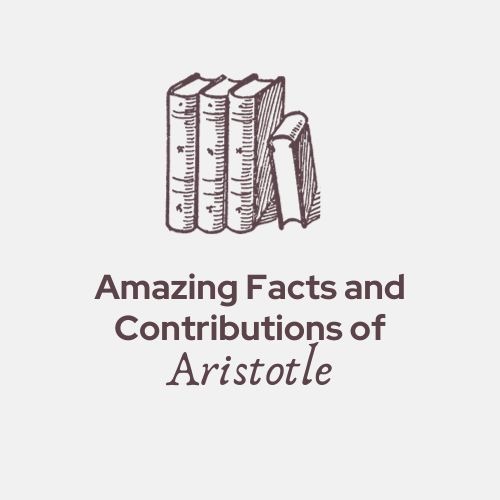Aristotle is one of the most important Greek philosophers in history along with Plato and Socrates and together they laid the foundation for Western Philosophy and Civilization. Aristotle did not only invented logic, but he was also the first systematic investigator of biology. One of Aristotle’s most important work was in the realm of metaphysics namely the study of the structure of reality. Let’s get to know more about Aristotle and the contributions he made to mankind.
Aristotle’s Contributions
Aristotle’s Books
Aristotle wrote almost 200 works and almost all of them are in the form of notes and manuscript drafts which is about politics, reasoning, ethics, psychology, and science. Most of Aristotle’s works consist of dialogues, systematic works, and records of scientific observations. Out of Aristotle’s 200 works, there are only 31 of it that are still in circulation and most of it was done when Aristotle is at the Lyceum.
Poetics
Aristotle observes, defines and analyzes mostly tragedy and epic poetry. And almost all of Aristotle’s literary works were composed around 330 BCE. And according to Aristotle, poetry is an imitative use of language, harmony, and rhythm which represents events and objects to the world and it should be able to involve the audience and make them feel katharsis. Most of his poetry still exist and survive to this day because they were carefully taken care of by Aristotle’s pupils during his lectures.
Ethics
One of the best-known works on ethics by Aristotle is the Nicomachean Ethics which lays out his thoughts on different moral virtues and their respective details. Aristotelian ethics is composed of different social and behavioral virtues of an ideal man. Aristotle believed that despite the influence of our parents, society, and nature it is always up to ourselves and our souls to decide.
Politics
Aristotle learned and examined the human behavior when it comes to the context of society and government. He believed that the government’s purpose was to make it possiblefor the citizens to achieve happiness and virtue. His work about politics is intended to guide rulers and statesmen. It explores the roles of citizens and politicians, why and how cities came to be, the purpose of the political system, types of governments, and the wealth and class system.
Metaphysics
Aristotle differentiated matter and form in his works about metaphysics. He said that matter was the physical substance of things and form was the unique nature of a thing which gave it its identity.
Categorical Syllogism
A Syllogism is a form of reasoning where a conclusion is made based on two premises. The premises always have a middle or common term that associates them together. And these declarative statements are formulated to defend an argument. Aristotle invented this concept when he was developing his theories on the use of logical arguments and rhetoric.
Classification of Human Beings
Aristotle was the first man to classify different kinds of animals. He used similar traits among certain animals to classify them under the same group. For example, he classified animals that live on water and the ones that live on land. Aristotle also believed that life had a hierarchical make-up and all the living things can be grouped in a hierarchy based on their position from lowest to highest and Aristotle placed the human beings at the highest strata in the hierarchy.
Metreology
Aristotle laid out details of differential affections which is common between air, water, and different kinds and parts of the earth. In his treatise entitled Meteora, he discussed water evaporation, earthquakes, and other common weather spectacles. Aristotle believed that earthquakes were caused by the existence of underground winds.
Interesting Facts About Aristotle
- The Aristotelian philosophy greatly influenced the Islamic and Christian religious thought
- When the Ancient Greek civilization collapsed, Muslim scientists carefully preserved Aristotle’s writing and passed it on to scholars in Europe and Asia.
- The method of questioning that Aristotle used has influenced many scholars around the world for several centuries.
- Aristotle always kept notes to help teach his students
- Aristotle had a son named Nicomachus but he died in a battle while he was still young. Some say that the Nicomachean Ethics which is a compilation of Aristotle’s notes was named after him and dedicated to him
- Aristotle was Alexander the Great’s tutor that is why it is said that the two were very good friends.
- Aristotle founded his own school and named it as the Lyceum.
- Aristotle died a year after he was forced to close his school and Alexander’s death. He was 62 years old when he died.
- Aristotle invented a new science he called “Casuality” which aims to explain why things happen.
Several centuries after his death, Aristotle remains to be one of the most important figures in the world. and his understanding of science paved the way for everything we know today.

